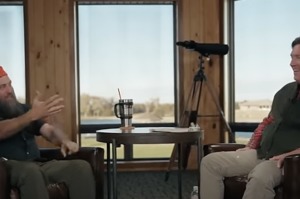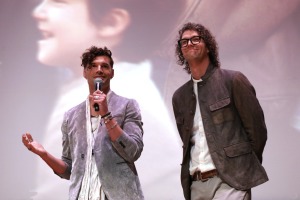Thankful to Whom?
As we approach Thanksgiving Day, most Americans know what we are thankful for, but to whom should we be thankful? Be careful with your answer, because it may offend the politically correct crowd.
A "religion debate" has arisen over Thanksgiving just as it has over Christmas. Andrew Santella writes about the debate on Slate.com. He explains both sides: there are the politically correct revisionists who want to point out every historical inconsistency and discrepancy in the Thanksgiving tradition in order to destroy its "religious roots", and there are the staunchly religious fundamentalists who argue that Thanksgiving must be labeled "Christian".
Santella argues that this bickering turns the holidays into "a tug of war between cold, hard history and comforting popular folklore, between fact and faith." His solution is not to argue for one or the other or even a separate position nearer the middle. Rather, Santella believes all positions are acceptable: "Shouldn't our holidays be able to accommodate both? . . . Can't we assume that the holiday has evolved as some more subtle mix of the secular and the spiritual, one that each of us can adjust according to our own values? . . . Prescribing to others the right way to observe the day is surely one aspect of the traditional Thanksgiving best left behind."
While Santella is correct to see the debate as overblown, his postmodernist answer leaves something to be desired. He is right that Thanksgiving is indeed a more "mixed" holiday than Christmas or Easter—it is not based on a "big event", whether "secular" or religious. But Santella errs by not recognizing the cultural tradition of Thanksgiving and what it means to be giving thanks and to whom.
Regardless of the precise historical details of when exactly the first thanksgiving was celebrated and whether it was a "harvest celebration" or a time of "specific thanksgiving", the important point is that Thanksgiving has been celebrated for many years as a specific time to give thanks as the original Pilgrim settlers gave thanks. This is what has been celebrated for over a century, regardless of its exact historical accuracy. Furthermore, the pilgrims gave thanks to the God of the Bible. Edward Winslow, the governor of the Plymouth Colony, wrote about the great harvest the colony had gathered and finished with, "And although it be not always so plentiful, as it was at this time with us, yet by the goodness of God, we are so far from want, that we often wish you partakers of our plenty." The Pilgrims saw all good things as coming from God, and thanked Him for His Providence. This has been the traditional American view of Thanksgiving ever since the holiday was celebrated in the individual States and then on the national level.
The "thanks" of the Thanksgiving tradition has always been directed towards God. Most of the early settlers thanked God regularly for his Providence. And when Abraham Lincoln instituted Thanksgiving as a national holiday in 1863, he described it as "a day of Thanksgiving and Praise to our beneficent father who dweleth in the Heavens." He meant it to be a day of thanks to God, penitence for man's disobedience, and prayer for the less fortunate.
This tradition seems to be changing now, as our culture becomes increasingly secularized. More and more, Americans are focused on eating and watching football on Turkey Day. True, we know what we are thankful for, but to whom do we owe our thanks? What is the meaning of Thanksgiving without God?
Some atheists argue that it is inappropriate to thank a "God" who does not exist. And, they acknowledge that it is less than satisfying to thank the Law of Gravity or the Second Law of Thermodynamics for all they have made possible for us. Hence, they argue, we should thank "goodness—the wonderful fabric of excellence created by individuals working together in human civilization to make this planet a better place." But does this really make sense? If the world is merely a product of random chance, if there is no Creator and no transcendent morality, can there be such a thing as "good"? And if this "wonderful fabric of excellence" is simply the result of cosmic accident, then is any thanks owed?
The sad reality of our secular society is that, while we retain many of our traditions, they are increasingly losing their meaning. Many "feel" thankful, but they have nothing to thank. Over time, as they continue to live out the logic of their position, they will eventually stare blankly into the abyss, their only feeling being one of despair.
Thankfully, I still know who to thank for my blessings. And for those of you who also know, I extend a hearty, "Happy Thanksgiving!"
___________________________________________________
Ken Connor is Chairman of the Center for a Just Society in Washington, DC and a nationally recognized trial lawyer who represented Governor Jeb Bush in the Terri Schiavo case. Connor was formally President of the Family Research Council, Chairman of the Board of CareNet, and Vice Chairman of Americans United for Life. For more articles and resources from Mr. Connor and the Center for a Just Society, go to www.ajustsociety.org. Your feedback is welcome; please email [email protected]



























